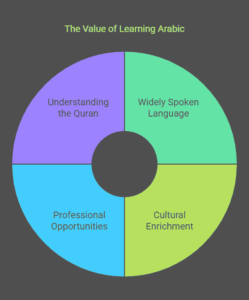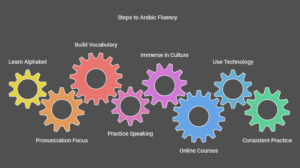Learning to speak Arabic can be a life-changing journey. It connects you to over 400 million native speakers, a rich cultural heritage, and a deeper religious understanding of Muslims. Whether you want to communicate while traveling, enhance your career prospects, or better understand the Quran, learning Arabic opens countless doors.
This guide will help you navigate the process of learning Arabic easily and effectively. We’ll discuss the best strategies, resources, and tips to make your journey toward Arabic fluency both enjoyable and rewarding.
Why Learn to Speak Arabic?

Before diving into how to learn Arabic, let’s explore why learning this language is so valuable:
1. Arabic is Widely Spoken
Arabic is the official language in over twenty countries, including Egypt, Saudi Arabia, and the UAE. Millions of Muslims worldwide speak it as the language of the Quran.
2. Cultural Enrichment
Learning Arabic gives you a deeper insight into Arab culture, traditions, and history. It helps break stereotypes and allows for a better understanding of the Arabic-speaking world.
3. Professional Opportunities
Arabic is in high demand in fields like business, international relations, and translation. Adding Arabic to your resume can set you apart in competitive global markets.
4. Understanding the Quran
For Muslims, Arabic is the language of the Quran. Learning Arabic allows for a more profound connection with Islamic teachings, prayers, and religious texts.
How to Speak Arabic: Proven Strategies

Here are practical steps and strategies to help you learn Arabic easily and efficiently, even if you’re starting as a complete beginner.
1. Start with the Basics: Learn the Arabic Alphabet
The Arabic alphabet consists of 28 letters and is written from right to left. Learning the alphabet is essential as it forms the foundation for reading, writing, and pronunciation.
- Focus on recognizing and writing each letter.
- Practice the short vowels (Harakat) and learn how they impact pronunciation.
- Use online resources like interactive apps or flashcards to make learning fun.
Tip: Dedicate 10–15 minutes daily to practicing the alphabet until you’re comfortable with it.
2. Focus on Arabic Pronunciation
Arabic has unique sounds that may not exist in your native language, such as ‘ayn (ع) and ghayn (غ). Mastering pronunciation early is critical for effective communication.
- Listen to native speakers through Arabic videos, podcasts, or Quran recitation.
- Record yourself pronouncing Arabic words and compare them to native pronunciation.
- Practice tongue placement and articulation for tricky letters using guides or online videos.
Remember: Don’t be discouraged by your accent. Fluency comes with consistent practice.
3. Build Your Vocabulary Strategically
You don’t need to memorize every Arabic word to start speaking fluently. Focus on learning the most common words and phrases used in everyday conversation.
- Start with essential categories: greetings, numbers, days of the week, and family members.
- Learn root words: Arabic words often share roots, making it easier to understand related vocabulary.
- Use the 80/20 rule: Learn the 20% of vocabulary used in 80% of conversations.
Example: Start with phrases like “As-salaam alaykum” (peace be upon you) or “Shukran” (thank you).
4. Practice Speaking from Day One
Many learners hesitate to speak Arabic because they feel they’re not “ready.” However, speaking early and often is the key to fluency.
- Find a language partner or tutor for conversational practice.
- Use apps like Quran Courses Academy to interact with native speakers.
- Practice speaking simple sentences aloud daily, even if it’s just to yourself.
Pro Tip: Don’t aim for perfection initially—focus on being understood.
5. Immerse Yourself in Arabic
The fastest way to learn Arabic is to immerse yourself in the language. Even if you can’t travel to an Arabic-speaking country, you can create an immersive environment at home.
- Watch Arabic TV shows or movies with subtitles.
- Listen to the Arabic Quran recitation to familiarize yourself with the sounds.
- Change your phone or computer language settings to Arabic.
6. Take Advantage of Online Arabic Courses
Online learning platforms, like The Quran Courses Academy, provide structured lessons for beginners and advanced learners. These courses focus on reading, writing, speaking, and Tajweed (proper Quran recitation).
- Benefits of online Arabic courses:
- Flexible scheduling for busy adults.
- One-on-one lessons with native Arabic tutors.
- Access to recorded lessons and personalized learning plans.
Learn to Speak Arabic Language Easily with our Online Arabic Speaking Course
7. Use Technology to Supplement Learning
Leverage the power of technology to make learning Arabic easier:
- Language apps: Use apps like Quran Courses Academy, Duolingo, or Memrise for vocabulary building and grammar practice.
- YouTube channels: Watch Arabic lessons designed for beginners.
- Flashcards: Use digital or physical flashcards for a quick vocabulary review.
8. Learn Arabic Grammar Gradually
Arabic grammar can seem complex, but it’s essential for constructing sentences and understanding context. Focus on:
- Verb conjugations and sentence structure.
- Understanding masculine and feminine forms.
- Mastering prepositions and connectors to improve fluency.
9. Stay Consistent with Daily Practice
Consistency is the key to mastering Arabic. Dedicate at least 20–30 minutes daily to practice speaking, reading, and writing.
- Set specific, achievable goals like learning 10 new words a week.
- Track your progress to stay motivated.
Common Challenges in Learning Arabic and How to Overcome Them
1. Arabic Dialects vs. Modern Standard Arabic (MSA)
Arabic has many dialects, but beginners should focus on learning Modern Standard Arabic (MSA) as it’s widely understood across all Arabic-speaking countries.
2. Overcoming Frustration
Learning Arabic can be challenging, but persistence pays off. Break lessons into smaller, manageable parts and celebrate small victories.
FAQs About Learning to Speak Arabic
1. How long does it take to speak Arabic fluently?
With consistent practice, beginners can achieve conversational fluency in 6–12 months.
2. Should I focus on reading or speaking first?
Start with reading to build a strong foundation, then practice speaking alongside to improve fluency.
3. Can I learn Arabic online?
Yes! Online courses like The Quran Courses Academy offer flexible and effective ways to learn Arabic from home.
4. What’s the best way to practice speaking Arabic?
Join language exchange programs, work with online tutors, or practice with native speakers through apps.
You can also check out our Online Arabic Reading Course
Conclusion: Take the First Step to Learn Arabic Today
Learning to speak Arabic is an enriching journey that connects you to a vibrant language, culture, and history. By focusing on the basics, practicing regularly, and immersing yourself in the language, you can achieve fluency faster than you think.
💻 Ready to start your Arabic journey? Join the Online Arabic Courses at The Quran Courses Academy today and learn from expert native tutors!



